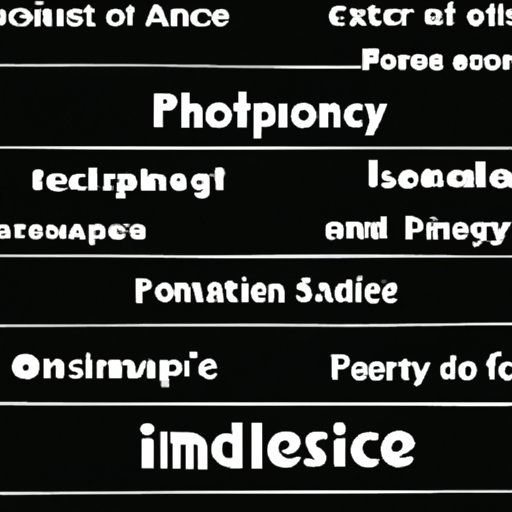Introduction
Themes are the fundamental and often universal ideas explored in a literary work. They are the main subject or topic of a piece of writing, and they provide a framework for understanding the story’s characters, plot, setting, and more.
Themes can be divided into two categories: universal themes that can apply to any time period and specific themes that relate to a particular time period or culture. Universal themes are those that can be found across different cultures and times, such as love, death, coming of age, and good versus evil. Specific themes include those related to a particular time period, such as fate versus free will in Ancient Greek and Roman literature, or nature versus nurture in Renaissance literature.
Popular Themes in Literature
Love is one of the most popular themes in literature. It can be portrayed in many different ways, from romantic love between two people to the love of family and friends. It has been explored in works from ancient stories like Homer’s Odyssey to modern novels like Jane Austen’s Pride and Prejudice.
Death is another common theme in literature. It can be used to explore mortality and the fragility of life, as well as the power of grief and mourning. Stories about death have been told since the beginning of time, from the Epic of Gilgamesh to William Shakespeare’s Hamlet.
Coming of age is a theme that has been explored in many different works. It can refer to physical maturity, but it also refers to emotional and psychological growth. Examples of this theme can be found in books such as J.D. Salinger’s Catcher in the Rye and Harper Lee’s To Kill a Mockingbird.
Good versus evil is a theme that is often explored in literature. It can be used to explore the struggle between what is right and wrong, or to examine the consequences of one’s choices. This theme can be found in works such as John Steinbeck’s The Grapes of Wrath and George Orwell’s Animal Farm.

Common Themes in Classic Literature
Fate versus free will is a theme that has been explored in many classic works, particularly those from Ancient Greece and Rome. In these works, characters are often presented with difficult choices and must decide whether their destiny is predetermined or if they have the power to choose their own path. Examples of this theme can be found in Sophocles’ Oedipus Rex and Virgil’s Aeneid.
Nature versus nurture is another theme commonly found in classic literature. This theme examines how much of a person’s character is determined by their environment and upbringing, and how much is predetermined by genetics. Examples of this theme can be found in William Shakespeare’s Macbeth and Mary Shelley’s Frankenstein.
The power of knowledge is a theme that has been explored in many classic works. It is often used to explore the consequences of gaining knowledge, as well as the potential power it can give someone. Examples of this theme can be found in Dante Alighieri’s Divine Comedy and Miguel de Cervantes’ Don Quixote.
Journey and discovery is a theme often found in classic literature. It can be used to explore the process of self-discovery, as well as the physical journey a character takes to reach their destination. Examples of this theme can be found in Homer’s Odyssey and J.R.R. Tolkien’s The Lord of the Rings.
Impact of Theme in Different Periods of Literature
Ancient Greek and Roman literature often focused on themes such as fate versus free will, nature versus nurture, and the power of knowledge. These themes were often used to explore the consequences of a character’s decisions and to examine the role of the gods in human affairs.
Medieval literature often explored themes such as good versus evil, the power of faith, and the importance of loyalty. These themes were often used to explore the roles of kings and queens, as well as the power of religion in society.
Renaissance literature often focused on themes such as the power of reason, the pursuit of knowledge, and the importance of individualism. These themes were often used to explore the new ideas of the time and to challenge traditional beliefs.
Modern literature often explores themes such as identity, gender, race, and sexuality. These themes are often used to examine the changing social and cultural landscape of the time and to explore issues of inequality and oppression.
How Theme Influences a Story’s Meaning and Impact
Themes are an important element of literature. They provide the framework for understanding a story’s characters, plot, setting, and more. Themes can also help establish the mood and tone of a story, as well as enhance character development.
Themes can also be used to unify plot elements and create connections between characters and events. For example, a theme of loyalty can be used to explain why a character makes a certain decision, or why a certain event occurs.
Conclusion
Themes are an essential element of literature. They provide the framework for understanding a story’s characters, plot, setting, and more. Themes can vary depending on the genre, period, and culture, but some popular themes include love, death, coming of age, and good versus evil. Themes can also help establish the mood and tone of a story, as well as enhance character development and unify plot elements.
In conclusion, themes are an important part of literature. They can help us understand a story’s meaning and impact, as well as explore universal truths about the human condition.
(Note: Is this article not meeting your expectations? Do you have knowledge or insights to share? Unlock new opportunities and expand your reach by joining our authors team. Click Registration to join us and share your expertise with our readers.)
